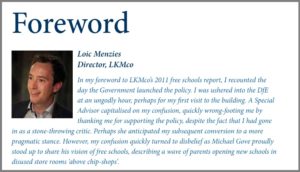Free Schools and Chip Shops: seven years on
23rd June 2018
 Seven years ago Michael Gove prophesised the dawn of a new era in which parents around the country set up new schools in chip shops.
Seven years ago Michael Gove prophesised the dawn of a new era in which parents around the country set up new schools in chip shops.
Of course things didn’t exactly turn out that way. The proportion of schools set up by parents has now dropped to fewer than one in five and a study by the NFER concluded that most could not be described as “innovative.”
Foreword
In my foreword to LKMco’s 2011 Free Schools report, I recounted the day the government launched the policy. I was ushered into the DfE at an ungodly hour, perhaps for my first visit to the building. A Special Advisor capitalised on my confusion, quickly wrong-footing me by thanking me for supporting the policy, despite the fact that I had gone in as a stone-throwing critic. Perhaps she anticipated my subsequent conversion to a more pragmatic stance. However, my confusion quickly turned to disbelief as Michael Gove proudly stood up to share his vision of Free Schools, describing a wave of parents opening new schools in disused store rooms ‘above chip-shops’.
The world has changed a lot since 2011. LKMco has grown from a small, niche organisation staffed by just Laura and I, to an established education ‘think and action tank’ producing dozens of detailed research studies each year. Meanwhile as this report makes clear, the Free Schools policy has evolved considerably. Chip shops have given way to schools in ex-DfE offices and fire stations, as well as a specialist service – LocatED – to find school sites. Many of the country’s free schools are part of networks of held together by multi-academy trusts – a far cry from the revolutionary parent-led outfits we were promised that morning.
Today's free schools are a far-cry from the parent-led start-ups in chip shops @MichaelGove promised Share on XI welcome these changes. As Laura explained in our original report, setting up a school requires systems and expertise and the practical and logistical challenges of finding sites are frequently what trip school-founders up. The DfE’s moves to provide longer timescales and to avoid temporary sites wherever possible are therefore sensible.
In many ways, free schools have grown up and this report provides an important opportunity to capitalise on this, providing expert insight into how school leaders have overcome the challenges they faced.
Mandy Southwick and Kerry Burnham for example, make it clear that listening to advice, consulting widely and building partnerships is crucial not only in combatting “feelings of superiority and uniqueness”, but also in providing schools that respond to local demand. Laura’s advice to “read the OFSTED reports of all local schools (primary & secondary), identify the problems they face and carefully plan how your school will deal with each issue” therefore remains just as important, as does her suggestion that founders remember that “these problems will affect you too”.
Similarly, Luke Sparkes shows that Free Schools cannot escape the national challenge of teacher recruitment. Yet in doing so, he also points out some of the important advantages free schools have in this respect – namely the ability to build a team, aligned around a way of working and an educational vision. He goes on to describe some of the more innovative ways Dixons has worked around applicant shortages and this is exactly the type of innovation I hope Free Schools will champion in the future.
Like the school leaders in this report, the Free Schools policy has “done a lot of miles” as Mandy Southwick puts it. This report therefore provides lessons not just for school founders, but also for policy makers. Rushing a policy is no better than rushing to set up a school, and in the past, the race to meet arbitrary targets for opening schools sometimes led to urgency being prioritised over solid foundations. This means there have been numerous struggles and hiccups along the way, but that should be no surprise. As I put it in my foreword to our original report “as many free schools will fail as traditional schools”.
Rushing a policy is no better than rushing a school. Urgency was often prioritised over solid foundations. Share on XSeven years on, this reflection marks considerable, and healthy progress with the policy. It is now a much better targeted; less rushed and, more appropriately resourced policy. I would therefore like to repeat my call from 2011:
“Let’s move on from the endless ‘evidence ping-pong’ about the success rates of Free Schools/ Charters/ Academies v. the mainstream… Let sceptics and enthusiasts leave behind the structural arguments and instead come together around a discussion of this reports’ recommendations. Let’s use evidence and experience to work out how young people can get the best deal from the Free Schools policy.”
 By bringing together real insight from founders, this report promises to help many more new schools transform young people’s lives and I would like to thank the New Schools Network for bringing it together.
By bringing together real insight from founders, this report promises to help many more new schools transform young people’s lives and I would like to thank the New Schools Network for bringing it together.
Loic Menzies,
Director, LKMco // @LKMco // cfey.dev

Comments